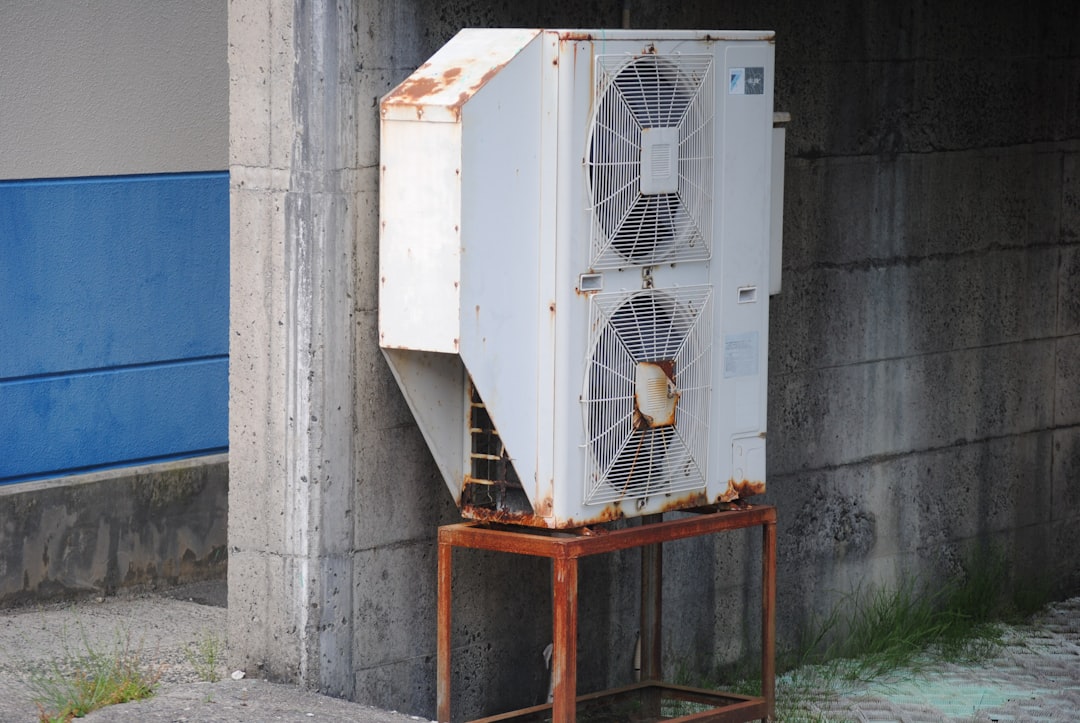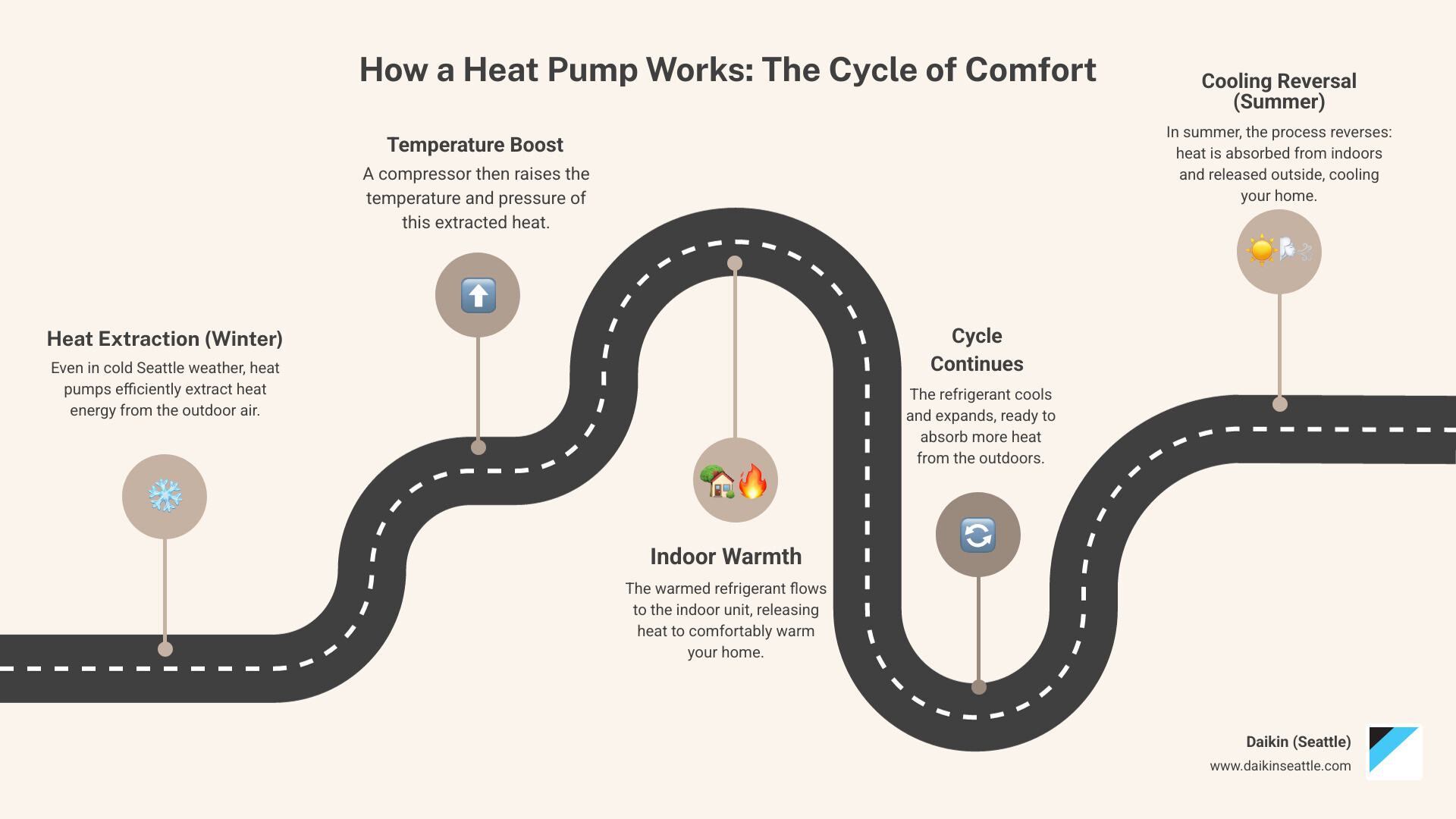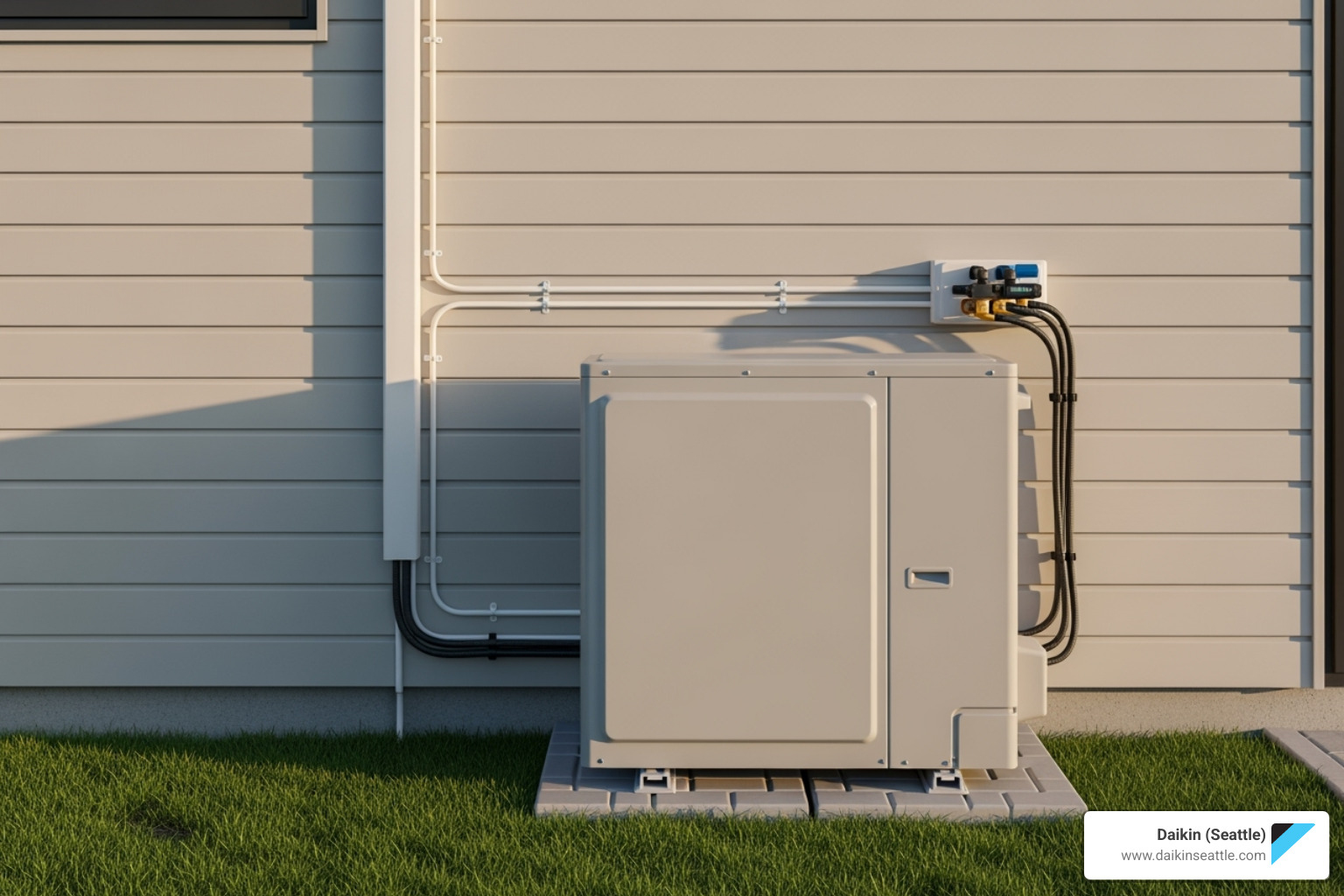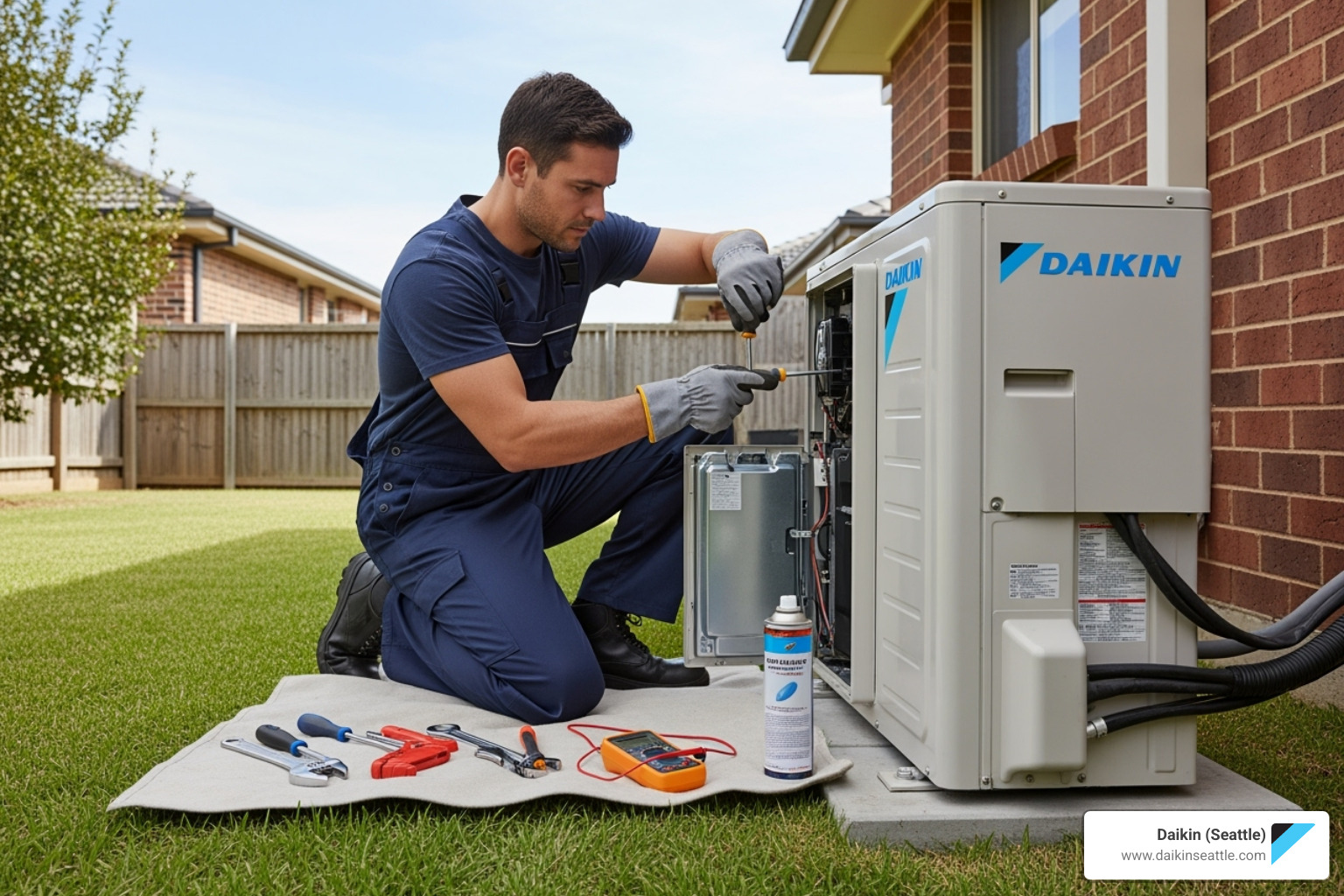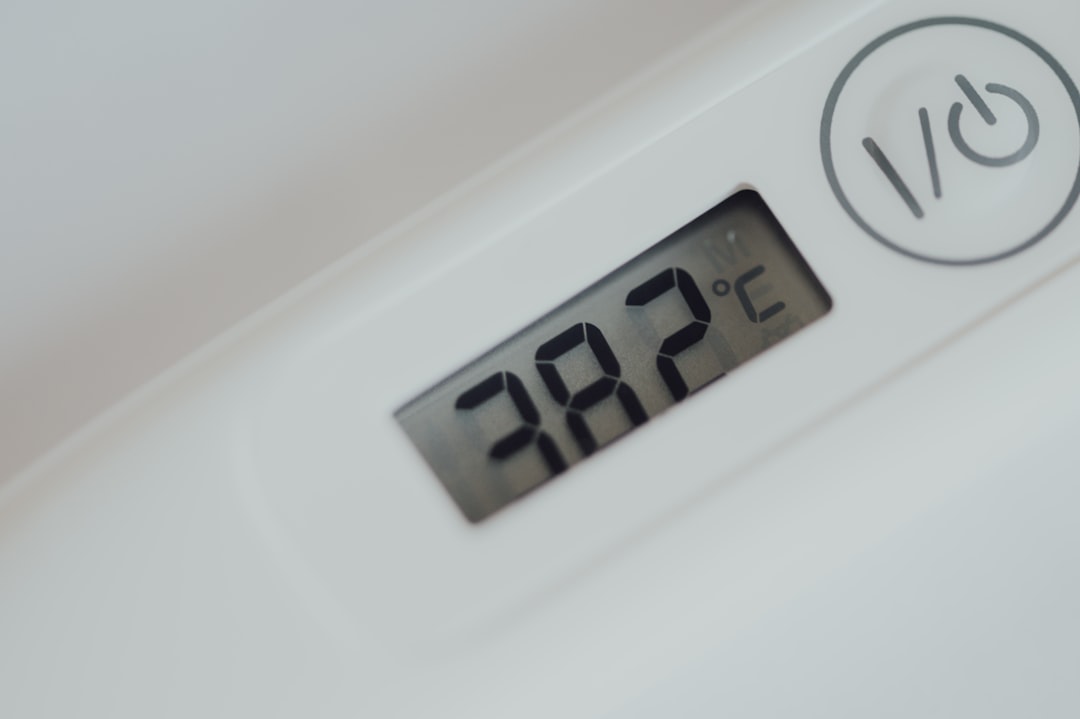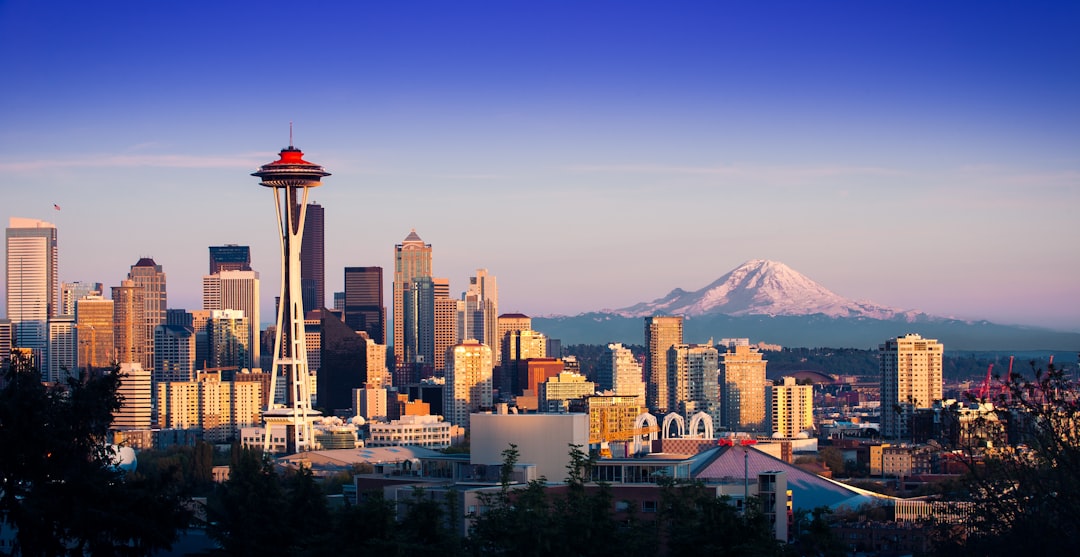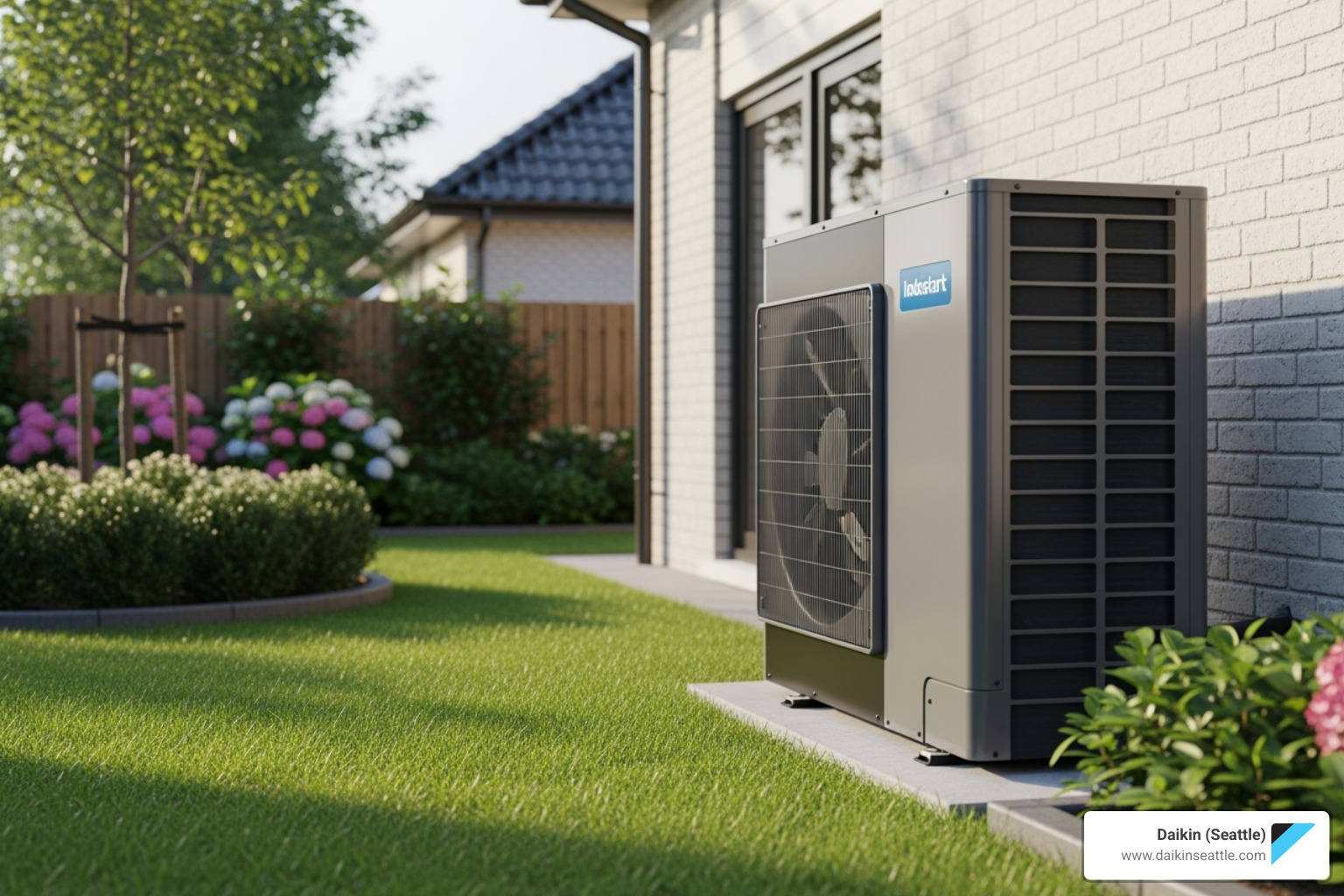Why Heat Pump Installation Seattle is Your Best HVAC Investment
The user wants me to write an SEO article about “Heat pump installation Seattle” for Daikin.
I need to follow the provided outline, including the exact intro.
The article should be around 2500 words, written in first-person plural (we, us, our), and have a simple, clear, and warm tone with humor where appropriate.
I must use all relevant information from the research provided and my own expert knowledge, but not make up facts.
I cannot mention competitors of Daikin.
I need to include specific image and infographic syntax.
I must avoid specific pricing information unless it’s a range from the research.
All section headers from the outline must be used with the correct heading level.
I need to bold “Heat pump installation Seattle” where relevant but not overdo it.
I need to ensure all questions from the outline are answered in detail.
I need to mention Daikin’s unique Pacific Northwest Daikin Experience Center in Seattle.
Let’s break this down by section:
1. Introduction (Provided)
- Include the exact intro text.
- Ensure the image and infographic syntax are correct.
2. Why a Heat Pump is the Smart Choice for Your Seattle Home
- Image: Family enjoying comfortable living room.
- Content: Benefits: Energy savings, lower utility bills (25-50%), environmental benefits, improved indoor air quality, year-round comfort, quiet operation (50-60 decibels).
- Research Integration: Use stats like “25-50% lower heating costs”, “50-60 decibels”, “15-18 year lifespan”. Mention “improved indoor air quality” (from Evergreen Home Heating).
- Tone: Simple, clear, warm.
2.1. Understanding Energy Efficiency Ratings (H3)
- Content: Explain SEER, HSPF, SEER2, HSPF2. Emphasize higher ratings mean more savings.
- Research Integration: Use SEER2, HSPF2 from Seattle City Light source. Mention that higher SEER/HSPF means greater energy savings (Brennan Heating).
- Link:
[Learn about efficiency from the experts at AHRI](https://www.ahrinet.org/certification/cee-directory/air-conditioning-and-heat-pump-efficiency-101).
3. Choosing the Right Heat Pump for Your Space
- Table: Compare Ducted vs. Ductless Mini-Split Heat Pumps (cost, installation, best use cases).
- Content: Explain Ducted systems, Ductless mini-splits, Hybrid/Dual-fuel systems.
- Research Integration: Ductless heat pumps are mini-splits (Evergreen Home Heating). Hybrid systems (Home Comfort Alliance).
- Link:
[Choosing the Right HVAC System]. (This is a placeholder link, I need to make sure to replace it with a valid markdown link or remove the brackets if no specific link is provided in the outline). Self-correction: The outline only provides the anchor text, so I will treat this as an internal link to another article on the site, using a placeholder URL.
3.1. Key Factors for Your Decision (H3)
- Content: Home size, layout, insulation, load calculation (Manual J), budget.
- Research Integration: Manual J (Evergreen Home Heating). Proper sizing is crucial (Evergreen Home Heating).
- Link:
[Most Energy Efficient HVAC Systems]. Self-correction: Same as above, placeholder URL.
4. The Heat Pump Installation Seattle Process & Costs
- Image: Clean installation with line hide.
- Content: Home assessment, sizing, quote comparison, permitting (from my knowledge), installation day, system testing.
- Research Integration: Home assessment (Evergreen Home Heating). Get at least three bids (Seattle City Light).
4.1. What’s the Typical Cost for Heat Pump Installation in Seattle? (H3)
- Content: Average cost range ($12,000 – $22,000). Equipment cost, labor cost.
- List: Factors influencing final cost (system size, efficiency, ductwork condition, number of indoor units).
- Research Integration: Use cost ranges from the forum thread: $12,000 to $15,000, $17,000, $21,000, $22,000. Combine these to create a broader range. “Not including tax” can be mentioned as a nuance. “Ductwork condition” (Evergreen Home Heating).
4.2. Open uping Savings: Rebates and Incentives (H3)
- Content: Seattle City Light rebates ($600+), Oil-to-electric conversion bonus ($2,000), Federal tax credits.
- Research Integration: Seattle City Light rebates ($300-$600, $2000 for oil conversion). Mention the “average annual savings for a customer with this program can be around $8,000” (Seattle City Light).
- Link:
[Explore how heat pumps work with Energy.gov](https://www.energy.gov/energysaver/heat-pump-systems).
5. Finding a Pro and Maintaining Your Investment
- Content: Lifespan (15-18 years), annual maintenance, filter cleaning, professional tune-ups.
- Research Integration: Lifespan (15-18 years in Western Washington, Evergreen Home Heating). Maintenance (twice a year recommended, Evergreen Home Heating).
- Link:
[Heat Pump] service. Self-correction: Placeholder link.
5.1. Finding a Reputable Contractor for Your Heat Pump Installation in Seattle (H3)
- Content: Licensed and insured, certified technicians (NATE), multiple quotes, check reviews, ask for references, Daikin Experience Center.
- Research Integration: NATE certified (Climate Pro LLC). Get multiple bids (Seattle City Light). Google reviews (forum thread). Daikin Experience Center (Company Info).
- Link:
[Daikin Dealers Seattle]. Self-correction: Placeholder link.
6. Frequently Asked Questions about Seattle Heat Pumps
- This section will answer the specific questions listed in the outline.
6.1. How long does a heat pump installation take? (H3)
- Content: 1-3 days, varies by system type, ductless is faster, ducted may take longer.
- Research Integration: “up to 3 days” (heatpumpseattle.com), “may take only a day” for ductless (heatpumpseattle.com), “one to three days” (Rainier Heating & Cooling).
6.2. Are heat pumps noisy? (H3)
- Content: Modern units are quiet, 50-60 decibels, similar to a refrigerator, placement matters.
- Research Integration: “50-60 decibels” (Evergreen Home Heating, heatpumpseattle.com). “Noise levels as low as 50-60 decibels” (Stats).
6.3. Do heat pumps work when it snows in Seattle? (H3)
- Content: Yes, modern systems are effective to low temperatures, defrost cycle, backup heat (for dual-fuel systems).
- Research Integration: “Even in colder temperatures, heat pumps can extract heat” (Home Comfort Alliance). “Heat pumps have an efficiency curve that drops as outdoor temperatures decrease. Some heat pumps can operate effectively at temperatures as low as 5°F.” (Forum thread). “Defrost cycles” (Forum thread). “Backup heat” (Forum thread).
7. Conclusion: Accept Year-Round Comfort and Efficiency
- Content: Recap benefits, long-term investment, energy independence.
- Link:
[Contact Us].[Daikin HVAC Solutions Seattle]. Self-correction: Placeholder links.
General Review:
- Word count: Aim for 2500 words. I’ll need to elaborate on each point.
- Tone: Simple, clear, warm, humor where appropriate.
- First person plural: “We”, “us”, “our”.
- No competitors mentioned.
- No specific pricing unless a range.
- All image/infographic syntax correct.
- Bold “Heat pump installation Seattle” where relevant.
- Exhaustive use of research.
- Daikin Experience Center mentioned.
Let’s start writing, keeping the word count in mind for each section. I will start by drafting each section’s content and then expanding where necessary to meet the word count and ensure full coverage. I will also make sure to weave in the Daikin brand naturally, given it’s for their website.
Heat pump installation Seattle offers homeowners the most efficient way to heat and cool their homes year-round. Here’s what you need to know:
Key Benefits:
- 25-50% lower heating costs compared to standard electric systems
- Dual functionality – heating in winter, cooling in summer
- Quiet operation at 50-60 decibels
- 15-18 year lifespan with proper maintenance
- Significant rebates available – up to $2,600 from Seattle City Light
Installation Timeline:
- 1-3 days for most installations
- Ductless systems: typically 1 day
- Ducted systems: 2-3 days
Investment Range:
- Systems typically cost $12,000-$22,000 installed
- Savings average $8,000 annually with rebate programs
Seattle’s mild winters and moderate summers make it an ideal climate for heat pump technology. Unlike traditional heating systems that generate heat, heat pumps transfer existing heat from the outside air – even when it’s cold – making them incredibly efficient.
As one Seattle homeowner noted: “Our house is finally warm and it won’t cost us an arm and leg to keep it that way.”
Modern heat pumps work by moving heat rather than creating it. They extract warmth from outdoor air (which contains heat energy even at low temperatures) and concentrate it inside your home during winter. In summer, the process reverses to cool your space.
Why a Heat Pump is the Smart Choice for Your Seattle Home
Choosing a heat pump for your Seattle home is a smart investment that pays dividends in energy savings, environmental benefits, and overall well-being. Imagine slashing your heating costs by 25% to 50% compared to traditional electric systems. Heat pumps don’t burn fossil fuels; they efficiently move existing heat, drastically reducing your energy consumption and utility bills.
By opting for a heat pump, you’re aligning with our city’s commitment to sustainability. Since Seattle is powered by mostly clean electricity, you significantly reduce your carbon footprint compared to heating with oil or natural gas. Heat pumps also improve indoor air quality by circulating air through filters, helping to remove dust and allergens.
Enjoy year-round climate control from one seamless system. Modern heat pumps are incredibly quiet, operating at noise levels as low as 50-60 decibels—about as loud as a normal conversation.
Understanding Energy Efficiency Ratings
When we talk about efficiency, we refer to ratings like SEER2 and HSPF2. Think of these as the “miles per gallon” for your HVAC system.
- SEER2 (Seasonal Energy Efficiency Ratio) measures cooling efficiency.
- HSPF2 (Heating Seasonal Performance Factor) measures heating efficiency.
The crucial takeaway is that higher ratings translate directly into greater energy savings. We recommend choosing systems with the highest ratings your budget allows, as they offer the best long-term return on investment through lower energy bills.
Learn about efficiency from the experts at AHRI.
Choosing the Right Heat Pump for Your Space
Finding the perfect heat pump for your Seattle home means choosing a tool that fits your specific needs. There are excellent options for every type of home, from cozy bungalows to spacious family houses.
- Ductless mini-split heat pumps are champions of flexibility. They are perfect for homes without existing ductwork or for controlling the temperature in specific rooms. They install quickly and offer precise zone control.
- Ducted heat pump systems work through your home’s existing ductwork to provide consistent, whole-house comfort. They are ideal if your ductwork is in good condition.
- Hybrid or dual-fuel systems combine a heat pump with a backup heating source, like a furnace. The efficient heat pump runs most of the time, with the backup kicking in automatically on the rare extremely cold days.
| Heat Pump Type | Best For | Installation Time | Key Benefits |
|---|---|---|---|
| Ductless Mini-Split | Homes without ductwork, room-by-room control, additions | 1 day | Quick install, zone control, high efficiency |
| Ducted System | Homes with existing ductwork, whole-house comfort | 2-3 days | Invisible operation, even temperatures, familiar feel |
| Hybrid/Dual-Fuel | Maximum efficiency and backup reliability | 2-3 days | Best of both worlds, automatic switching |
Choosing the Right HVAC System
Key Factors for Your Decision
Making the right choice comes down to a few key factors. We perform a professional load calculation (a Manual J) which considers your home’s size, layout, and insulation to size your system perfectly. This ensures optimal comfort and efficiency. We also consider your budget and existing ductwork condition to recommend the system that gives you the best combination of comfort, efficiency, and value.
Most Energy Efficient HVAC Systems
Why a Heat Pump is the Smart Choice for Your Seattle Home
Imagine one system that keeps your Seattle home perfectly comfortable all year while cutting your energy bills. That’s the reality of a heat pump installation Seattle homeowners are finding every day. Most of our customers see 25-50% lower heating costs compared to old electric systems.
Heat pumps move existing heat rather than creating it, making them incredibly efficient. Living in Seattle gives us an advantage, as our clean, hydro-powered electricity makes your heat pump one of the greenest choices available. You’ll also enjoy improved indoor air quality, as heat pumps continuously filter and circulate your air. Plus, modern systems are whisper-quiet, operating at just 50-60 decibels.
With a 15-18 year lifespan, a quality heat pump is a long-term investment in your home’s value. You can see these systems for yourself at our unique Pacific Northwest Daikin Experience Center right here in Seattle.
Understanding Energy Efficiency Ratings
Think of efficiency ratings as your heat pump’s report card. SEER2 measures cooling efficiency, while HSPF2 measures heating efficiency. The higher these numbers, the less electricity your system uses. Seattle City Light even offers instant discounts for qualifying high-efficiency units. Choosing the highest efficiency your budget allows pays for itself through long-term energy savings.
Learn about efficiency from the experts at AHRI.
Choosing the Right Heat Pump for Your Space
Selecting the perfect heat pump for your Seattle home is about finding the right fit. We can tailor a solution for any home, whether it’s a charming Craftsman or a modern townhome.
Ducted systems are fantastic if you have ductwork in good condition, providing quiet, consistent comfort throughout your entire home. For homes without ducts, or for room additions, ductless mini-splits are brilliant problem-solvers that allow for individual temperature control. Hybrid or dual-fuel systems offer the best of both worlds, combining an efficient heat pump with your existing gas furnace for backup during occasional cold snaps.
No matter your home’s personality, a heat pump installation Seattle can be custom to your space. There’s a system that will work perfectly for you.
Choosing the Right HVAC System
Key Factors for Your Decision
Choosing a heat pump isn’t a one-size-fits-all situation. We consider several key factors to ensure a perfect match for your home and lifestyle.
- Home Size & Layout: A system that’s too small will struggle, while one that’s too large will waste energy. We size it just right.
- Insulation & Windows: Good insulation helps any system perform better. We can recommend improvements to boost efficiency.
- Load Calculation: We use a scientific Manual J calculation that considers everything from square footage to window types to size your system for optimal performance.
- Budget: A heat pump is an investment that pays you back through lower energy bills. We’ll help you find a high-quality system that fits your financial comfort zone.
Most Energy Efficient HVAC Systems
The Heat Pump Installation Seattle Process & Costs
Our heat pump installation Seattle process is designed to be straightforward and stress-free. It begins with a thorough home assessment, where our certified technicians evaluate your space, insulation, and ductwork to recommend the perfect system. We then provide a clear, detailed quote. We encourage getting multiple quotes, but remember to compare the overall value, not just the price.
Once you approve the project, we handle all permitting to ensure your installation meets local codes. On installation day, our team works efficiently to get your new system running. Ductless systems often take just one day, while ducted systems may take two to three. We finish with comprehensive system testing and walk you through how to operate your new heat pump, ensuring you feel confident from day one.
What’s the Typical Cost for Heat Pump Installation in Seattle?
Seattle homeowners can expect to invest between $12,000 and $22,000 for a complete heat pump installation. This range covers both equipment and professional labor. Your final cost will depend on factors like system size, efficiency rating (SEER2/HSPF2), the number of indoor units for a ductless system, and the condition of your existing ductwork. This is an investment that improves your home’s comfort and value while paying for itself in energy savings.
Open uping Savings: Rebates and Incentives
Seattle offers generous rebates that make upgrading more affordable. Seattle City Light provides instant rebates from $300 to $600 for qualifying high-efficiency heat pumps. If you’re converting from oil heat, you can get a $2,000 instant rebate through the Seattle Clean Heat Program. On top of that, federal tax credits can cover a portion of your installation costs. Combined, these incentives can lead to significant savings, making a heat pump an incredibly smart financial decision.
Explore how heat pumps work with Energy.gov.
Finding a Pro and Maintaining Your Investment
With proper care, a heat pump in Western Washington can have a robust 15 to 18-year lifespan. The key to maximizing this investment is consistent maintenance. We recommend professional service twice a year—once in the spring for cooling and once in the fall for heating. Between visits, simply keeping your system’s filters clean will maintain efficiency and prevent unnecessary strain.
Our professional tune-ups are a comprehensive health check for your system. Technicians clean coils, check refrigerant levels, and inspect electrical connections, catching small issues before they become expensive problems.
Finding a Reputable Contractor for Your Heat Pump Installation in Seattle
Choosing the right contractor is as important as choosing the right heat pump. Here’s what to look for to ensure a quality heat pump installation Seattle project:
- Licensed and Insured: This is non-negotiable and protects you during the installation.
- Certified Technicians: Look for NATE-certified professionals who have proven their expertise.
- Multiple Quotes: Compare the scope of work, warranties, and overall value, not just the bottom-line price.
- Reviews and References: Check online reviews and ask for references from past customers.
- Visit the Daikin Experience Center: We invite you to our unique Pacific Northwest Daikin Experience Center in Seattle. Here you can see our technology and get your questions answered by experts before you buy.
Frequently Asked Questions about Seattle Heat Pumps
Choosing a new HVAC system is a big decision, and it’s natural to have questions. Here are the answers to some of the most common ones we hear from Seattle homeowners.
How long does a heat pump installation take?
Most heat pump installation Seattle projects are completed in just one to three days. The exact timeline depends on the system type. A ductless mini-split installation is often finished in a single day. A ducted system that connects to your home’s existing ductwork typically takes two to three days to ensure a perfect integration.
Are heat pumps noisy?
Not at all. This is a common myth, but modern heat pumps are remarkably quiet. They typically operate at just 50-60 decibels, which is comparable to the gentle hum of a refrigerator or a quiet conversation. Our technicians also strategically place the outdoor unit to minimize any sound, ensuring your home remains a peaceful sanctuary.
Do heat pumps work when it snows in Seattle?
Absolutely. Modern heat pumps are engineered to work efficiently even in cold weather. They can extract heat from the air at temperatures as low as 5°F, which is colder than a typical Seattle winter day. During snowy conditions, the system may run a brief, automatic defrost cycle to melt any ice from the outdoor coil before returning to heating your home. For extra peace of mind, a hybrid system pairs the heat pump with a backup heat source that kicks in seamlessly if temperatures ever drop dramatically.
Conclusion: Accept Year-Round Comfort and Efficiency
Making the switch to a heat pump installation Seattle is one of the smartest investments for your home. You get year-round comfort, lower energy bills, and the satisfaction of using clean, efficient technology. With a 15-18 year lifespan and significant savings from rebates and tax credits, a heat pump is a long-term investment in your home’s value and your family’s well-being.
The Pacific Northwest climate is ideal for heat pump technology, ensuring reliable performance through every season. You’ll enjoy improved indoor air quality and quiet, consistent comfort for years to come.
Ready to transform your home? We’re here to guide you every step of the way.
Contact Us to schedule your consultation, and explore our Daikin HVAC Solutions Seattle to find the perfect system for your needs.

